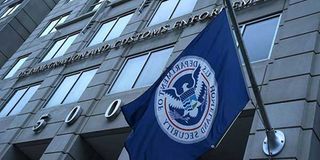Why the US cut Nigerian visas to single-entry, 3-month limits

The US Immigration and Customs Enforcement agency headquarters.
The United States has tightened visa rules for Nigerian applicants significantly, reducing the validity of most non-immigrant visas to three months and limiting them to single entry.
This change took immediate effect and marks a major shift in travel accessibility for Nigerian business travellers, tourists and families, bringing with it broader diplomatic implications.
The US said the decision was part of a global reciprocity realignment, which means it was repaying Nigerians in the same coin on visa validity. It marks a shift from previous visa terms, which often permitted multiple entries over two years or more for non-immigrant categories such as short visits for family or business trips.
“Effective immediately, most non-immigrant and non-diplomatic visas issued to Nigerian citizens will be single-entry with a validity period of three months,” the US Embassy in Nigeria said.
The State Department says that visa policies remain “subject to ongoing review” and may change depending on evolving diplomatic, security and immigration benchmarks.
“Visa reciprocity is an ongoing process that is subject to review and change at any time. This may involve increasing or decreasing the number of permitted entries or the validity period,” it added.
In a statement, the US government said it was working closely with Nigerian authorities to help the country meet key international standards.
“The US Mission is working with the Government of Nigeria to ensure that Nigeria can meet the criteria,” the statement said.
Nigeria also offers single-entry visas, valid for three months only, to Americans.
The US fell short of placing Nigeria on the list of total blockade for visas but wants Abuja to issue travel documents with verified traveller, identities and that these documents are secure. It also said Nigeria should handle:
•€ Visa overstay management: Implementing measures to prevent individuals from overstaying their visas.
•€Information sharing: Exchanging relevant security and criminal record data to enhance public safety.
Despite the new restrictions, the US Embassy has reaffirmed its strong diplomatic ties with Nigeria.
"Ongoing reforms"
“The United States deeply values its long-standing relationship with Nigeria and remains dedicated to strengthening our partnership, which is rooted in mutual respect, shared security goals and economic collaboration. This cooperation ensures the safety and prosperity of both nations.”
The embassy also praised Nigeria’s ongoing reforms, adding: “We applaud the progress made by Nigeria’s immigration and security agencies in aligning with global best practices.”
Nigerian travellers were reminded to adhere to all visa regulations to avoid complications.
The US has also ordered that the social media accounts of all foreign visa applicants, including those from Nigeria, will be vetted for “any indications of hostility towards US citizens, culture, government, institutions or founding principles”.
Nigerians submit some of the highest numbers of student visa applications to the US worldwide.
According to the 2024 Open Doors report on international educational exchange, Nigeria was the seventh-largest source of international students in the US and the largest in Africa, with 20,029 students enrolled.
The report, published by the US Department of State's Bureau of Educational and Cultural Affairs, showed a 13.5 percent increase from 2023.
The Nigerian government suggested it had been surprised by the decision. Kimiebi Ebienfa, the spokesperson for the Ministry of Foreign Affairs told the local daily Premium Times that Washington was likely implementing a long-term policy not based on Nigeria’s recent actions.
“It is not that we initiated or implemented a new policy that they are responding to,” the official was quoted by the paper on Wednesday.
Some Nigerians felt the decision was an expression of discomfort with Nigeria’s geopolitical stances. Bashir Ahmad, a former aide to former Nigerian President Muhammadu Buhari believes that President Bola Tinubu’s recent visit to Brazil for the BRICS gathering was behind the move.
“This is not solely about reciprocity. Rather, it appears to reflect growing US discomfort with Nigeria's increasing global realignment, particularly the warm reception we are receiving from the BRICS,” he wrote. The BRICS group condemned US tariffs on trading partners and lampooned Israel and US attacks on Iran last month.


